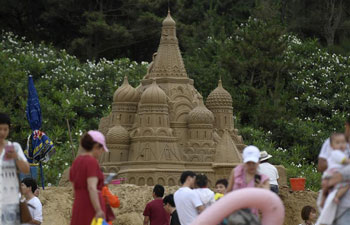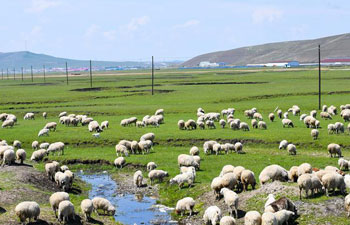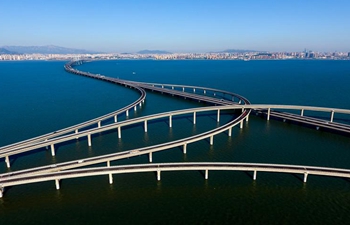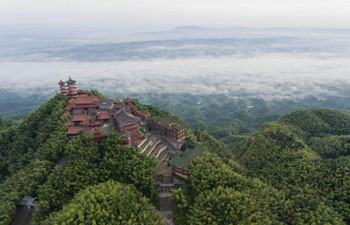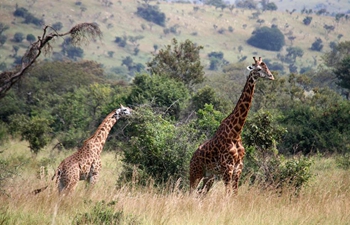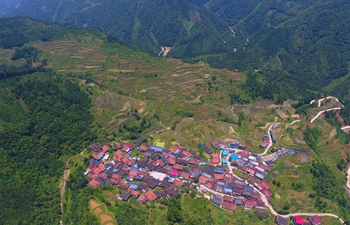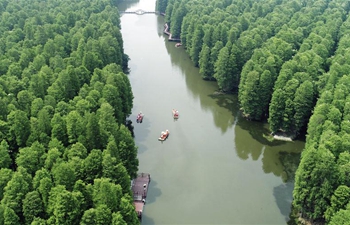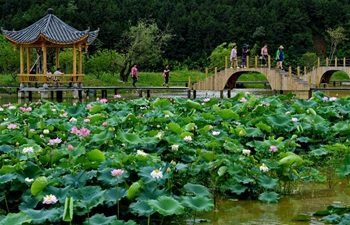
Greek coast-guards officers are seen in a coast-guard boat, at Marina Zeas, in Athens, Greece, June 8, 2018. The search and rescue operations of thousands of migrants crossing the Aegean Sea, along with combating the illegal trade circuit are among the top priorities and challenges for the Greek Coast Guard, a Greek official told Xinhua here.
by Alexia Vlachou
ATHENS, June 9 (Xinhua) -- The search and rescue operations of thousands of migrants crossing the Aegean Sea, along with combating the illegal trade circuit are among the top priorities and challenges for the Greek Coast Guard, a Greek official told Xinhua here.
"The most important thing is to be out in the sea. To be responsible, to provide adequate search and rescue operations of human lives, to safeguard the Greek and European sea borders and to fight any illegal activity at the sea," the Commander of the Greek Coast Guard and head of the Integrated Maritime Surveillance Service George Christianos said on Friday.
The Aegean Sea route between Turkey and Greece has been the major way for migrants fleeing the Middle Eastern countries to get to Europe.
But, according to Christianos, the number of people illegally crossing the Aegean Sea has dropped significantly after the EU-Turkey agreement.
"In 2017, smugglers transferred illegally 31,000 migrants monthly from the Turkish shores to the Greek islands and European soil. In 2018, the number has stabilized monthly to 3,000. These numbers are manageable by the Greek coast guard with the contribution and the cooperation of the European means," he said.
Since 2015 over one million migrants and refugees entered the Greek islands from the Turkish shores.
"Unfortunately, most of the operations were search and rescue because the boats they used were small, inflatable boats, without the required seaworthy certifications. We saw boats sized 6-7 meters with 50 to 60 persons without lifejackets," he said.
Two facts contributed to stem the flow of refugees and migrants; the contribution of the European Border and Coast Guard Agency (Frontex) to the Greek Coast Guards' efforts and the EU-Turkey statement agreement in 2016.
"In 2017 and the first months of 2018, we see the positive results of the deal and the cooperation with the Turkish authorities," Christianos noted.
For Christianos, there is no danger that the EU-Turkey deal will be disrupted.
"The EU-Turkey deal is valid and will be until further notice. There are constantly contacts in European level with the presence of the European Commission. From the Turkish parts, they want to continue the cooperation and to follow what the agreement requires. The financial motive provided by the European Union to the Turkish part is very important," he said.
More than 50 coast guard boats patrol day and night at the Eastern part of the Aegean Sea in cooperation with 20 Frontex vessels.
A total of 2,000 seamen from Greece and Europe are in the frontline to surveil the European and Greek borders and to provide help to all those migrants who will be traced and need to be rescued.
For Christianos, experience and calm are two major prerequisites for the success during a rescue operation.
"The Greek and European seaman who is on duty must have the experience to cope with such incidents. Also, calm because unfortunately under those conditions there could be human losses or babies and pregnant women in shock. With calm you need to approach, to help and save," he told Xinhua.
Currently the Greek Coast Guard consists of 250 vessels of all types: 5 offshore patrol vessels sized 45-60 meters in length, 12 patrol boats with lengths of 30 meters that can contribute under difficult weather conditions and coastal patrol vessels of various types with lengths of 18 meters.
"We are in the procedure of upgrading our fleet. Five more 30 meters high speed patrol boats will be added. While, more than 20 patrol boats sized 20 meters in length will come in the next 3 to 4 years," Christianos said.
Apart from the search and rescue operations, the Greek coast guard has stepped up its efforts in combating the drug trafficking rings and illegal trade especially in regions near the sea borders where there is no migrant activity, like offshore in south of Crete, or in south of Peloponnese.
"During the last years, due to the geographic position of our country which is strategic as a crossroad of three continents, we track illegal networks that try to smuggle drugs, cannabis and guns at sea," he noted.
"They try to transport illegally from the Turkish or African shores to European soils and other neighboring countries through cargo ships, leisure boats and even sailing boats. At first sight it doesn't seem anything strange, but if we search or there is an information, you can have scoops," he explained.
According to the latest data, in 2017 and 2018 more than 100 boats that performed illegal trade have been traced, there have been more than 500 arrests for drug trafficking and other illegal products.
More than 40 to 50 boats have been confiscated for that reason. Regarding the quantity, approximately 13 tons of cannabis, more than 100 kilos of heroin, cocaine, and other opiates, in addition to smuggled cigarettes and guns have been seized.







